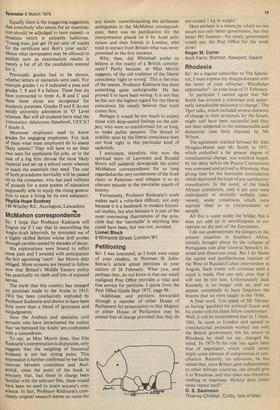McMahon correspondence
Sir: I hope that Professor Kedourie will forgive me if I say that in unravelling the Anglo-Arab labyrinth, he reminded me of a highly skilled dentist whose drill probes through cavities caused by decades of decay.
His explorations were bound to inflict some pain and I awaited with anticipation the first agonising 'ouch': Jan Morris duly Obliged. More screams are bound to follow now that Britain's Middle Eastern policy has practically no teeth and lots of exposed nerves.
The myth that this country has reneged on promises made to the Arabs in 19151916 has been conclusively exploded by Professor Kedourie and shown to have been little more than a blend of ignorance and Misjudgments.
Now the Arabists and specialist civil servants who have perpetuated the notion that 'we betrayed the Arabs' are confronted With a conundrum.
To say, as Miss Morris does, that Elie Kedourie's interpretation is disputable, only suggests that the weighing of historical evidence is not her strong point. This impression is further confirmed by her facile Contrast between conscience and RealPolitik,since the point of the book is Precisely that, had those in charge been familiar with the relevant files, there would have been no need to strain anyone's conscience. In fact, Professor Kedourie's comPletely original research leaves no room for
any doubt: notwithstanding the deliberate ambiguities in the McMahon correspondence, there was no justification for the interpretation placed on it by Arab politicians and their friends in London, who tried to extract from Britain what was never promised in the first instance.
Why, then, did Whitehall prefer to believe in the reality of a British commitment? Partly because, as Miss Morris suggests, of the old tradition of the liberal conscience 'right or wrong'. This is the crux of the matter. Professor Kedourie has done something quite unforgivable. He has proved it to have been wrong. It is not that he has not the highest regard for the liberal conscience. He merely believes that truth comes first.
Perhaps it would be too much to expect those with deep-seated feelings on the subject, who were so misinformed for so long, to make public penance. The thread of nobility spun by the liberal conscience does not look right in this particular kind of sackcloth.
I anticipate, therefore, that now the spiritual heirs of Lawrence and Ronald Storrs will suddenly downgrade the entire McMahon correspondence for so long regarded as the very cornerstone of the Arab claim to Palestine—and relegate it to an obscure episode in the inevitable march of history.
Fortunately, Professor Kedourie's work makes such a volte-face difficult, not only because it is a landmark in modern historical studies, but also because it is one of the most convincing illustrations of the principle that the 'inevitable' is anything that could have been, but was not, avoided. Lionel Bloch 9 Wi m pole Street, London W1


































 Previous page
Previous page